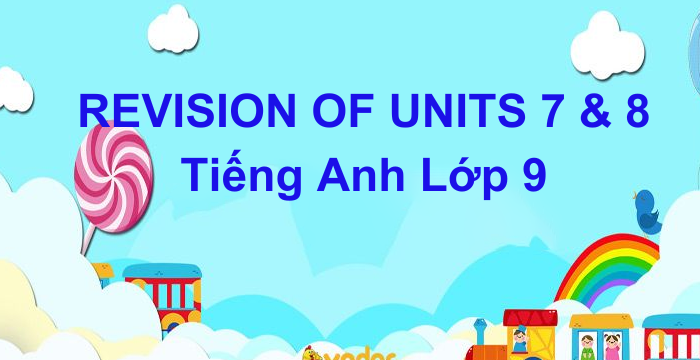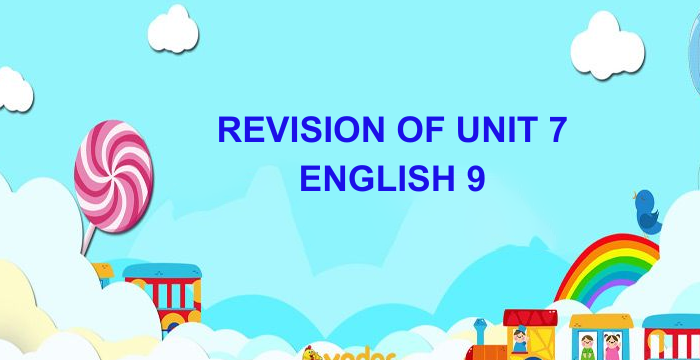Bài Tập Bổ Trợ UNIT 1 LOCAL COMMUNITY Tiếng Anh Lớp 9 Global Success (25.08.2024)
Thầy Thắng
CHUYÊN ĐỀ LỚP 9
15
Ngày đăng: 25-08-2024 09:55:57

UNIT 1 : LOCAL COMMUNITY
A. VOCABULARY:
|
Word |
Pronunciation |
Meaning |
|
artisan (n) |
/ˌɑːtɪˈzæn/ |
thợ làm nghề thủ công |
|
community (n) |
/kəˈmjuːnəti/ |
cộng đồng |
|
community helper |
/kəˈmjuːnəti ˈhelpə/ |
người phục vụ cộng đồng |
|
craft village |
/ˌkrɑːft ˈvɪlɪdʒ/ |
làng nghề thủ công |
|
cut down on |
/kʌt daʊn ɒn/ |
cắt giảm |
|
delivery person |
/dɪˈlɪvəri ˈpɜːsn/ |
nhân viên giao hàng |
|
electrician (n) |
/ɪˌlekˈtrɪʃn/ |
thợ điện |
|
facilities (n, plural) |
/fəˈsɪlətiz/ |
cơ sở vật chất |
|
firefighter (n) |
/ˈfaɪəfaɪtə/ |
lính cứu hoả |
|
fragrance (n) |
/ˈfreɪɡrəns/ |
hương thơm |
|
function (n) |
/ˈfʌŋkʃn/ |
chức năng |
|
garbage collector (n) |
/ˈɡɑːbɪdʒ kəlektə/ |
nhân viên dọn vệ sinh |
|
get on with (phrasal verb) |
/ɡet ɒn wɪð/ |
có quan hệ tốt với |
|
hand down |
/hænd daʊn/ |
truyền lại |
|
handicraft (n) |
/ˈhændikrɑːft/ |
sản phẩm thủ công |
|
look around |
/lʊk əˈraʊnd/ |
ngắm nghía xung quanh |
|
original (adj) |
/əˈrɪdʒənl/ |
nguyên bản |
|
pass down |
/pɑːs daʊn/ |
truyền lại |
|
police officer (n) |
/pəˈliːs ɒfɪsə/ |
công an |
|
pottery (n) |
/ˈpɒtəri/ |
đồ gốm |
|
preserve (v) |
/prɪˈzɜːv/ |
bảo tồn |
|
run out of |
/rʌn aʊt əv/ |
hết, cạn kiệt |
|
speciality (n) |
/ˌspeʃiˈæləti/ |
đặc sản |
|
suburb (n) |
/ˈsʌbɜːb/ |
vùng ngoại ô |
|
tourist attraction |
/ˈtʊərɪst əˈtrækʃn/ |
điểm du lịch |
|
stuff (v) |
/stʌf/ |
đồ đạc (trong nhà) |
|
remind (sbd) of |
/rɪˈmaɪnd/ |
nhắc nhở, làm nhớ lại (cái gì) |
B. GRAMMAR:
I. Question words before to-infinitives.
(Các từ để hỏi trước to-infinitive)
1.1. Cách dùng :
- We use a question word such as who, what, where, when, or how before a to-infinitive to express an indirect question about what we should do.
(Chúng ta sử dụng từ để hỏi như who, what, where, when hoặc how trước động từ nguyên thể có "to" để diễn tả một câu hỏi gián tiếp về việc chúng ta nên làm gì.)
- We often use a verb such as ask, wonder, (not) decide, (not) tell, or (not) know before the question word + to-infinitive.
(Chúng ta thường sử dụng các động từ như ask, wonder, (not) decide, (not) tell, hoặc (not) know trước từ để hỏi + to-V.)
Example 1:
a) We don't know what to do to help the community.
(Chúng tôi không biết phải làm gì để giúp đỡ cộng đồng.)
b) She asked how to get to the nearest shopping mall.
(Cô ấy hỏi làm thế nào để đến trung tâm mua sắm gần nhất.)
1.2. Mỗi cặp câu ví dụ có nghĩa giống nhau.
Notes: (Wh) + to-Infinitive = should / can / could + V
Example:
a) I don't know what I should do.
🡪 I don't know what to do.
b) Sam can't decide whether she should go or stay home.
🡪 Sam can't decide whether to go or (to) stay home.
c) Please tell me how I can get to the bus station.
🡪 Please tell me how to get to the bus station.
d) Ha told us where we could find it.
🡪 Ha told us where to find it.
II. Phrasal verbs: ( Động từ tổ hợp / Cụm động từ)
1. Phrasal verb là gì?
Phrasal verb (Cụm động từ) là sự kết hợp giữa một động từ với 1 hoặc hai tiểu từ (particles). Các tiểu từ này có thể là trạng từ (adverb) hoặc giới từ (preposition). Thông thường, sau khi thêm các tiểu từ này vào sau, nghĩa của cụm động từ sẽ thay đổi .
Example: "give up" (từ bỏ) là một phrasal verb, được tạo thành bằng cách kết hợp động từ "give" với giới từ "up".
+ Với mỗi phrasal verb, sự kết hợp giữa động từ, giới từ và phó từ sẽ tạo ra một nghĩa mới và phải được học và sử dụng trong ngữ cảnh thích hợp để truyền đạt ý nghĩa chính xác.
Example:- Look at, look after, look up, look for, look through.......
- Turn on, turn off, turn up, turn down.......
- Get on, get up, get off .....
+ Một số giới từ thường gặp: on, about, in,of, at, for, into, from, to, by…
Example: look at (nhìn vào), listen to (nghe), depend on (phụ thuộc vào). blow up (nổ tung); come across (tình cờ gặp) look after (chăm sóc) ; count on (dựa vào)…
+ Một số trạng từ thường gặp: up, anyway, down, back, out, through, off.
Example: walk away (rời đi), run out (hết), speak up (nói to hơn). look up (tra (từ)) ; get along (hòa thuận) drop back (tụt lại) ; get away (chạy trốn, trốn thoát); hand down (truyền lại)…
+ We often use verbs with: in, out, on, off, up, down, away, back, by, through, about ,along, over, forward, round, or around…
2. Cấu trúc của phrasal verb có thể là:
1) Verb + preposition (động từ + giới từ) : Một số giới từ thường gặp: on, about, in,of, at, for, into, from, to, by..
Example: look at (nhìn vào), listen to (nghe), depend on (phụ thuộc vào), blow up (nổ tung); come across (tình cờ gặp), look after (chăm sóc) ; count on (dựa vào)
2) Verb + adverb (động từ + trạng từ): Một số trạng từ thường gặp: up, anyway, down, back, out, through, off.
Example: walk away (rời đi), run out (hết), speak up (nói to hơn). look up (tra (từ)) ; get along (hòa thuận), drop back (tụt lại) ; get away (chạy trốn, trốn thoát), hand down (truyền lại)
3) Verb + adverb + preposition (động từ + trạng từ + giới từ). Động từ + giới từ + phó từ:
Example: get on with (tiếp tục), look forward to (mong đợi), put up with (chịu đựng).
look down on (coi thường) ; come up with (nghĩ ra) run out of (hết, cạn kiệt) ; cut down on (ắt giảm, giảm bớt) , break up with (chia tay với)
III. Cách sử dụng của phrasal verb ( Động từ tổ hợp).
1. Phrasal verb là nội động từ ( Intransitive verbs), nội động từ không có tân ngữ đi kèm
Example: a. She suddenly showed up (Cô ấy đột ngột xuất hiện)
b. When I grow up, I want to be a teacher
c. Shall we eat out tonight? [intransitive]
d. He told me to shut up. [intransitive]
2. Phrasal verb là ngoại động từ ( transitive verbs) có tân ngữ đi kèm
Example: a. I am looking for my glasses.
b. I look after my father.
c. He came into the room and then he turned on the lights.( Transitive verbs).
d. She tore up the letter. [transitive]
3.1 Một số phrasal verb là ngoại động từ thì không thể chèn tân ngữ vào giữa, tân ngữ đứng sau giới từ.
Example:
a) My brother ran into an old friend yesterday. They are looking into the problem.
b) My car broke down at the side of the highway in the snowstorm
c) Jane look after her younger sister while her mother’s at work.
d) You're walking too fast. I can't keep up with you.
e) I came across an old photo in my drawer. [NOT …came an old photo across]
Eg: + She tore up all the letters he had sent her.
+ Why don't you try on that dress in the window?
3. 2 Một số phrasal verb là ngoại động từ có thể chèn được tân ngữ ở cả 2 vị trí
Example: - “She looked the number up in the phone book.”
hoặc “She looked up the number in the phone book.”
- “My mother wakes up me.”
OR “My mother wakes me up.”
* Nếu tân ngữ là đại từ (me, it, him, her them,..), tân ngữ luôn được đặt trước trạng từ.
Eg:
- She read the letter and then tore it up. (Cô ấy đọc lá thư rồi xé nó.) [NOT ... tore up it.]
- Do you want these newspapers or shall I throw them away? NOT... throw away them]
4. Các cụm động từ có ba thành phần (verb + adverb + preposition) thường có nghĩa đặc biệt và không thể tách rời.
- Look forward to ( Trông mong ): Childrens look forward to Christmas.
- Keep up with ( Theo kịp với ) : You're walking too fast. I can't keep up with you.
- Get on with . (Hoà thuận với..) : She's never really got on with her sister.
- Put up with ( Chịu đựng) : I don't know how she puts up with him.
..........
** MỘT SỐ CỤM ĐỘNG TỪ THÔNG DỤNG (See below)
+ go out = leave your house to go to a social event. ( Rời khỏi nhà để đi tham dự một sự kiện xã hội)
+ pass down = give or teach something to your children ( Cho hoặc dạy điều gì đó cho con bạn)
+ cut down on = reduce the amount or number of something.
( Giảm lượng hoặc số lượng của một cái gì đó)
+ run out of = have no more of (hết, cạn kiệt = không còn nữa)
+ apply for : xin (việc); apply to : nộp đơn cho ; catch up with : theo kịp …..
B. PRACTICE EXERCISES
Exercise 1: Match each word or phrases with its definition.
|
|
|
|
1. suburb 2. facilities 3. community 4. get on with 5. remind sb of 6. preserve 7. fragrance 8. original |
a. the people living in a particular area; the place where people live b. to make somebody remember or think about somebody or something. c. to keep something as it is d. existing since the beginning e. to have a good relationship with somebody f. an area outside the centre of a city g. the buildings, equipment, and services provided for a particular purpose. h. pleasant smell |
1+ ……. 2 + ……. 3 + ……. 4 + ……. 5 + ……. 6 + ……. 7 + ……. 8 + …….
Exercise 2: Write the activities from the box under the correct pictures.
|
suburb |
facilities |
community |
get on with |
preserve |
|
remind (sbd) of |
police officers |
speciality |
fragrance |
handicrafts |
1. Our __________ help keep law and order in our community.
2. Spring rolls are the __________ I like best.
3. They don't live in the city centre but in a __________ of Ha Noi.
4. I love our new neighbourhood because we __________ the people here.
5. Com Lang Vong has a special __________ so it is very popular.
6. There are enough sports __________ for people of all ages in our local park.
7. My home town is famous for __________ , such as paper fans and lanterns.
8. Souvenirs __________ people ______ a place, an occasion, or a holiday.
9. The villagers __________their traditional weaving techniques.
10. The local __________ encourages us to protect the environment and keep our neighbourhood clean.
Exercise 3 : Complete each of the sentences with a suitable word or phrase from the box.
|
garbage collector |
artisans |
electrician |
speciality |
suburb |
|
handicrafts |
well- known |
reminds |
Tourist attractions |
facilities |
1. This beautiful headband __________ us of our holiday in Greece.
2. Skilled local __________ made these beautiful flower vases.
3. Com Lang Vong is __________ in Viet Nam as a speciality of Ha Noi autumn.
4. The electrical wires in our neighbourhood broke down yesterday, so we had to call a(n) __________.
5. They didn't like the noisy city centre, so they moved to live in a(n) ________ of London.
6. Bun cha, pho, and hu tieu are examples of famous Vietnamese __________ .
7. The condo is so small and there are not enough__________ for families with young children.
8. The __________ in our street usually comes at 6 p.m. to take the rubbish away
9. Tourists to Hoi An usually buy traditional __________ such as lanterns as souvenirs.
10. The Tower of London is one of the top __________ in the UK.
Exercise 4. Fill in each blank with a suitable question word: how, where, what, who , when… (Điền vào mỗi chỗ trống một từ để hỏi thích hợp: how, where, what, who , when….)
1. I don't know _______ to deal with this problem.
2. My sister wondered _______ to buy the best cakes.
3. Could you tell me _______ to do to get on well with my new neighbours?
4. They asked _______ to take out the rubbish, at 5 or 6 p.m.
5. He can't decide _______ to give his books to.
6. My classmate didn’t understand _______ to do.
7. My neighbour asked me _______ to use the dishwasher
8. They don't know _______ to preserve the natural beauty of their region.
Exercise 5: Fill in the blanks with when, where, what, or how...to complete the sentences.
1. I have so many ingredients, but I don't know _______ to make!
2. This city is so expensive. I don't know_______ to live.
3. I want to marry my girlfriend, but I'm not sure _______ to propose.
4. Help! My room is infested with ants. I don't know_______ to do!
5. Help me decide_______ to go on vacation.
6. Do you know________ to do if you are stung by a bee?
7. My husband and I are so busy these days. We don't know_______ to celebrate our anniversary.
8. I want to speak better English, but I don't know_______ to do that.
Exercise 6 : Rewrite the following sentences using question words+ to- infinitives
1. We don't know where we should put the sofa.
🡪_________________________________________
2. The rules didn't specify who I should speak to in case of an emergency.
🡪_________________________________________
3. Mai wondered how she could ride the scooter.
🡪_________________________________________
4. Let us decide when we should start the project.
🡪_________________________________________
5. Could you tell me where I can find a good hotel?
🡪_________________________________________
6. We must find out what we are to do next.
🡪_________________________________________
7. A good dictionary tells you how you should pronounce the words.
🡪_________________________________________
8. We are not sure who we will meet at the entrance.
🡪_________________________________________
9. I can't remember when I have to turn off the oven.
🡪_________________________________________
10. Do you know what you should look for?
🡪_________________________________________
Exercise 7: Match each phrasal verb with its meaning. (Nối mỗi cụm động từ với nghĩa của nó.)
|
|
|
|
1. look around 2. come back 3. hand down 4. find out 5. take care of 6. pass down 7. cut down on 8. go out |
a. to be responsible for somebody/something b. to walk around a place to see what is there c. to get information about somebody or something d. to return to a place e. to give something to somebody younger than you f. leave your house to go to a social event g. give or teach something to your children h. reduce the amount or number of something. |
1+ …… 2 + …… 3 + …… 4 +…… 5 + …… 6 + …… 7 + …… 8 + ……
Exercise 8 . Complete each sentence using the correct form of a phrasal verb in the box.
(Hoàn thành mỗi câu sử dụng dạng đúng của cụm động từ trong hộp .)
|
hand down |
find out |
ran out of |
went out |
takes care of |
|
looking forward to |
looking around |
come back |
gets on well |
cut down on |
1. How often do your grandparents __________ to their home town?
2. Our class are really __________ having a trip to the National Park.
3. The artisans in my village usually __________ their skills to their eldest children.
4. If you want to __________ about our community, you can go to the local museum.
5. They __________ bread when I went to the local bakery yesterday.
6. My brother forgot to take an umbrella when he __________ . I hope it won't rain.
7. When we aren't at home, our neighbour __________ our cats.
8. Whenever I go to a new place, I spend time __________
9. We are encouraging the people in our community to __________ plastic bags.
10. Janet is very friendly and generally __________ with the people she works with.
Exercise 9 . Complete the sentence with the one word given below. One word can be used for more than one sentence: for / up / after/ on / off / away / in .
1. Who’s going to look __________ the children while you’re away?
2. “Turn __________ the TV for me, will you? I want to watch the cartoon.
3. She’s looking __________ her keys everywhere.
4. Turn __________ the radio. I’m working.
5. If we go __________ littering, the environment will become seriously polluted.
6. Don’t throw these newspapers __________.
7. Could you fill __________ this form?
8. Don’t wake the baby __________ . Let him sleep.
9. Don’t believe her. She’s just made __________ the story.
10. Susan took__________ her coat and put it on the sofa.
Exercise 10: Complete the sentences by using the correct form of the phrasal verbs in brackets.
1. Nobody is watching the TV. __Turn it off____. (turn off)
2. There is always litter here. No one ever __________ . (pick up)
3. ‘Do you want this box? ‘No, you can __________ . (throw away)
4. ‘Do you know the meaning of this word?’ ‘No, have you __________ in the dictionary? (look up)
5. Shhh! The children are asleep. Don’t __________ . (wake up)
6. It’s quite cold outside. Put on your coat! Yeah, __________ right now. (put on)
7. Have you washed up the dishes? – I’m going to __________ . (wash up)
8. I haven’t heard from my sister recently. Perhaps I should __________ now. (ring up)
9. I wanted to buy a shirt from that shop, but when I __________ . It didn’t fit me. (try on)
10. They gave me a form and told me to __________ . (fill in)
11. It’s quite dark. There the light! Could you please __________ (turn on)
12. A: Do you still have my keys?
B: No. Don’t you remember? I __________ to you yesterday. (give back)
C. READING
I. Fill in each blank with a suitable word from the box to complete a passage about a
Nowadays delivery people are commonly seen in our city. Of all the delivery people who (1) ______ us products, our family likes Mr Nam the most. Mr Nam is about 40 years old and usually wears a yellow (2) _______ . He is a kind, friendly, and responsible person. (3) _______ he brings a product to our house, he always calls to check if we are at home. I still remember one day when we were in Ho Chi Minh City, Mr Nam called my father several times until my father answered his call. He (4)_______ us that we had a parcel. As we were not at home, my father asked him to (5) _______ the parcel with our neighbour. Mr Nam found our neighbour and called us before giving the parcel to her. He also allowed us to transfer money to him by online banking. My father sometimes talks to him and he happily shares about his life and work.
1. A. delivery B. deliver C. deliveryman D. transferring
2. A. wear B. parcel C. uniform D. delivery
3. A. Before B. Without C. After D. Until
4. A. ask B. spoke C. said D. told
5. A. sell B. leave C. receive D. sent
II. Read a passage about Sardinia and do the exercises that follow. Answer the questions.
Sardinia is the second largest island in Italy. It is famous for its beautiful nature and a variety of ancient crafts. One of the crafts that makes the island well-known is basket weaving. This is considered one of the most remarkable handicrafts on the island because it combines manual skills and natural resources.
Baskets are usually woven by Sardinian women. They have handed down the techniques from generation to generation. The shapes and dimensions of the baskets are different according to the technique, the area of production, and the kind of material used. They use various natural materials such as willow, palm, straw, and hay.
In the past, people hung the baskets on the walls of their houses or displayed them on shelves like artwork. Today the baskets are used in homes or used for decorative purposes. People really appreciate the craft because nowadays it is increasingly rare to find good quality baskets like these. Sardinian people believe that basket weaving is a dying skill and they hope to preserve it in the future.
1. Why is basket weaving remarkable?
🡪 ________________________________________
2. Who usually weaves the baskets?
🡪 ________________________________________
3. What decides the shapes and dimensions of the baskets?
🡪 ________________________________________
4. Why do people appreciate the craft of basket weaving?
🡪 ________________________________________
5. What do Sardinian people hope to do?
🡪 ________________________________________
D. WRITING.
I. Choose the correct sentence A, B, C, or D that can be made from the given cues.
1. My area / famous / some specialities / such / bun cha, banh cuon / and bun oc.
A. My area is famous some specialities such as bun cha, banh cuon, and bun oc.
B. My area is famous as some specialities such as bun cha, banh cuon, and bun oc.
C. My area is famous for some specialities such as bun cha, banh cuon, and bun oc.
D. My area is famous for some speciality foods such bun cha, banh cuon, and bun oc.
2. The pottery artisan / can make / beautiful / pot / vase / local clay.
A.The pottery artisan can make beautiful pots and vases from local clay.
B. The pottery artisan can make beautiful pots and vases by local clay/
C. The pottery artisan can make beautiful pot and vase from local clay.
D. The pottery artisan can make beautiful pots and vases from a local clay.
3. As firefighters, / they / ready / put out / fires / and save / people.
A. As fire fighters, they ready to put out f ires and save people.
B. As firefighters, they are ready put out f ires and save people.
C. As firefighters, they ready put out fires and save people.
D. As f irefighters, they are ready to put out f ires and save people.
4. The doctor/ask/ him / cut down / sweet food / drinks.
A. The doctor asked him cut down on sweet food and drinks.
B. The doctor asked him to cut down on sweet food and drinks.
C. The doctor asked him to cut down sweet food and drinks.
D. The doctor asked him cut down sweet food and drinks.
5. We / sometimes / take care / neighbours' children / when / they / not / home.
A. We sometimes take care our neighbours' children when they are not home.
B. We sometimes take care of our neighbours' children when they not at home.
C. We sometimes take care our neighbours' children when they not be at home.
D. We sometimes take care of our neighbours' children when they are not at home.
II. Rewrite the following questions in reported speech, using question words before to-infinitives.
1. “What should we do to help her overcome stress?”
🡪 ________________________________________
2. “Should I discuss this matter with my teammates?”
🡪 ________________________________________
3. “Where should I register for a course on life skills?”
🡪 ________________________________________
4. “How should we find a support center for the homeless?”
🡪 ________________________________________
5. “When should we start our campaign?”
🡪 ________________________________________
6. “Mom, who should I call upon arriving at the airport?”
🡪 ________________________________________
7. “Should I dial 18001567 to ask for advice about family problems?"
🡪 ________________________________________
8. “What should we do to help those disadvantaged children?”
🡪 ________________________________________
9. “When should I start teaching my children to cook?”
🡪 ________________________________________
10. “How should I deal with negative emotions and stress?”
🡪 ________________________________________
II. Rewrite each sentence so that it contains the phrasal verb in brackets. You may have to change the form of the verb. (Viết lại mỗi câu sao cho có cụm động từ trong ngoặc. Bạn có thể phải thay đổi hình thức của động từ.)
1. My grandparents gave the skills to my parents. (hand down)
🡪 ________________________________________
2. Before we go to a new place, we always get information about it. (find out)
🡪 ________________________________________
3. In some villages, people reduce the number of steps to make the handicraft. (cut down on)
🡪 ________________________________________
4. I am thinking with pleasure about the weekend. (look forward to )
🡪 ________________________________________
5. What time did you get out of bed this morning. (get up)
🡪 ________________________________________
6.In their community, the eldest child is usually responsible for his or her parents.(take care of)
🡪 ________________________________________
7. We have to try harder so that our handicrafts can stay equal with theirs. (keep up with)
🡪 ________________________________________
8. We arranged to meet in front of the lantern shop at 8 o’clock, but she didn’t arrive.(turn up)
🡪 ________________________________________
9. They have a good relationship with all neighbours. (get on with)
🡪 ________________________________________
10. Where did you get the information about Disneyland Resort? (find out)
🡪 ________________________________________
III. You receive an email from Mark, your penfriend in the US. He asks you to write about the things you like in your community.
Write an email (about 100 words) to tell him about these things .
|
From : ……… (your email address) To: mark @ gmail . com Subject: My lovely community. Dear Mark, I’m happy to have received your email. I’m going to tell you about the things you like in your community. _________________________________________ _________________________________________ _________________________________________ That’s all for now, Mark. Tell me about your community. Cheer, ____________ |
Giải đáp mọi thắc mắc trong đề vui lòng liên hệ Zalo: 034 8371 758
Theo dõi fanpage để cập nhật nhanh các bài tập và đề kiểm tra mới nhất.
https://www.facebook.com/profile.php?id=61555984765050
Bài Viết Liên Quan

Unit 10: Planet Earth Tiếng Anh Lớp 9 Global Success (02.04.2025)

Unit 7 Natural wonders of the world Tiếng Anh Lớp 9 Global Success (12.02.2025)

Bài Tập UNIT 4 Remembering the past Tiếng Anh Lớp 9 Global Success (26.11.2024)

REVISION UNIT 1, 2 Tiếng Anh Lớp 9 Global Success (10.10.2024)

TEST FOR UNIT 1 LOCAL COMMUNITY Tiếng Anh Lớp 9 Global Success (26.08.2024)

Bài Tập UNIT 1 LOCAL COMMUNITY Tiếng Anh Lớp 9 Global Success (23.08.2024)

Bài Tập UNIT 1 LOCAL COMMUNITY Tiếng Anh Lớp 9 Global Success (10.08.2024)

Ôn Tập Unit 7, 8 Tiếng Anh Lớp 9 (05.03.2024)

Bài Tập Unit 7 Tiếng Anh Lớp 9

Bài Tập Unit 7 Tiếng Anh Lớp 9

Bài Đăng Gần Đây

Đề Cương Ôn Tập Giữa Học Kì 2 Tiếng Anh Lớp 7 Global Success (24.02.2026)

Đề Kiểm Tra Giữa Kì 2 Tiếng Anh Lớp 7 Global Success (3.2.2026)

Đề Kiểm Tra Cuối Kì 1 Tiếng Anh Lớp 10 Global Success (02.01.2026)

Đề Cương Ôn Tập Cuối Học Kì 1 Tiếng Anh Lớp 8 Global Success (30.12.2025)

